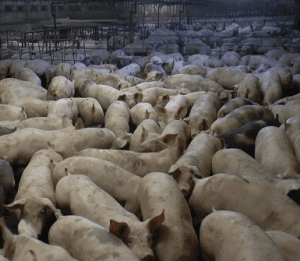 (April 27, 2018) A North Carolina jury awarded $50 million to neighbors of a huge Chinese-owned hog farm in Eastern North Carolina yesterday. The jury deliberated less than two days. The case was the first in a series of federal lawsuits filed against Murphy-Brown, a subsidiary of the Chinese global food giant Smithfield Foods. The world’s largest pork producer was sued over its 15,000-hog farm in Carolina.
(April 27, 2018) A North Carolina jury awarded $50 million to neighbors of a huge Chinese-owned hog farm in Eastern North Carolina yesterday. The jury deliberated less than two days. The case was the first in a series of federal lawsuits filed against Murphy-Brown, a subsidiary of the Chinese global food giant Smithfield Foods. The world’s largest pork producer was sued over its 15,000-hog farm in Carolina.
In a federal courtroom in Raleigh, the hog farm neighbors’ lawyers focused on the continued use of “anaerobic lagoons” behind the livestock pens. Hog waste was stored there, liquefied, then sprayed onto nearby fields.
Ten neighbors alleged that industrial-sized hog operations have known for decades that the open-air sewage pits on their properties were the source of noxious, sickening, overwhelming odors. Neighbors said the stench was so thick it was impossible to remove it from their clothes. They say odors and mist from the spray drift onto their property; that the hogs attract swarms of flies, buzzards, and gnats; that boxes filled with rotting dead hogs produce an especially pungent odor; that the rotting smells has limited their ability to go outside.
The plaintiffs argued that the Chinese company’s waste-management practices are the problem that creates a public nuisance. Smithfield Foods has not changed its method of disposal since the 1980s and ’90s.
U.S. Pork Costs lower than China’s
The neighbors’ attorneys argued that waste treatment methods have evolved but Smithfield Foods has not. The neighbors’ attorneys said pork production operations in Eastern North Carolina have not changed their methods because it keeps operational costs lower than in China.
Michelle Nowlin, the supervising attorney for the Environmental Law and Policy Clinic at Duke Law and the Nicholas School of the Environment at Duke University, said by email that the verdict “(is) a significant victory for the community members who live next to these factory feedlots. They have suffered indescribable insults, not just from the immediate impacts of the feedlots themselves, but also from decades of government failure to come to their aid. Litigation was their last chance for justice, and this verdict and award will help them move forward.
“This verdict proves, once and for all, that ‘cheap meat’ is a myth. Someone pays the price of production, and for far too long, that burden has been on the rural communities that are home to North Carolina’s factory farms. This verdict forces the industry to internalize and reckon with those costs. I’m hopeful this decisive victory will be a game-changer in North Carolina and force the industry to modernize its waste-treatment, to the benefit of rural communities, the environment, and the farmers themselves.”
Smithfield calls Lawsuit an Attack on Farmers
Keira Lombardo, senior vice president of corporate affairs for Smithfield Foods, painted the verdict as an attack on industry and contract farms. She said in a statement, “We are extremely disappointed by the verdict. (These) lawsuits are an outrageous attack on animal agriculture, rural North Carolina and thousands of independent family farmers who own and operate contract farms. These farmers are apparently not safe from attack even if they fully comply with all federal, state and local laws and regulations.”
Hog Farm neighbors win $50 million Jury Award
The $50.75 million verdict would be equally divided among the ten plaintiffs. The verdict orders each plaintiff to receive $75,000 in compensatory damages and $5 million in punitive damages, but that amount seems likely to be drastically reduced by North Carolina tort reform law, written by corporations in tandem with state government representatives. A Smithfield attorney has already noted that North Carolina law restricts punitive damages to no more than $250,000.
Free Legal Consultation
Our law firm is investigating environmental pollution cases, such as this one. If you have been sickened, nauseated, or otherwise suffered personal and/or economic harm by a factory farm near you, contact us today for a free legal consultation regarding a potential environmental lawsuit against the company that owns the factory farm.
Related
- $3 Million Verdict in Texas Fracking Case

by Matthews & Associates




